The 14 Greatest War Movies Of The 21st Century
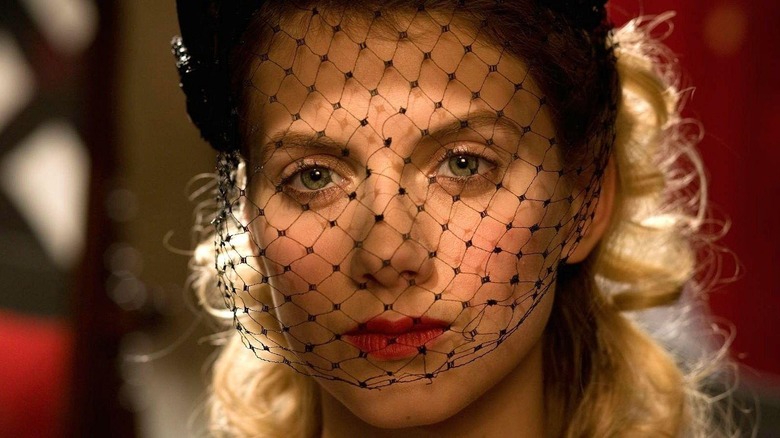
The war movie has been around as long as movies themselves, and they make for an important historical document. Comparing WWII movies made during or just after that war with ones made 50 to 70 years later, with the benefit of hindsight, is a fascinating exercise. While the Second World War does dominate the war movies that are made to this day, lesser-known conflicts around the world and throughout history also make for compelling subjects.
Hardly any of the war movies mentioned here feature big battles -- they're more about focusing on a few individuals who are affected by war, either during the conflict or in its aftermath. While many of these films are of course heartbreaking, there is also romance, humor, and thrilling action to be found on occasion, too. War movies reveal the human condition in its rawest form — when everything we have is stripped away and lives are on the line, who do we become? These 14 movies made during the 21st century expose humanity's bravery and sacrifice, cowardice and cruelty, and everything in between.
Black Hawk Down
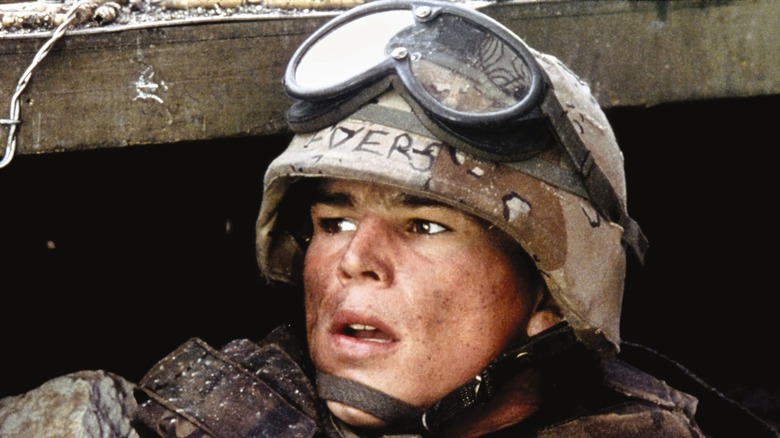
Featuring a veritable who's who of the young actors of the day, Ridley Scott's film about a real operation in 1993 Mogadishu that went badly wrong is a high-octane, tense thriller. "Black Hawk Down" features (deep breath) Josh Hartnett, Ewan McGregor, Eric Bana, Tom Hardy, Ron Eldard, Orlando Bloom, and many more in a huge ensemble cast.
An operation to capture two Somali lieutenants results in two black hawk helicopters being downed and the survivors left as sitting ducks. The initial mission escalates into a two-day long stand-off on the ground, with soldiers desperately having to call on their training to defend the crash sites, while one of the pilots -- Michael Durant (Eldard) -- is captured.
While the film has been understandably criticized for not using Somali actors and for historical and cultural inaccuracies, it also isn't exactly glorifying war or the American military presence in the region. It shows things going wrong, the US military making mistakes, and ordinary soldiers being left high and dry due to underestimating the enemy and the breakdown of communications.
Scott does well to make a film with so many moving parts comprehensible, and although we don't really get backstories or character development for anyone involved, we are given enough reason to care because the men care about each other. It's very well shot and edited, making for an intense experience.
Waltz With Bashir
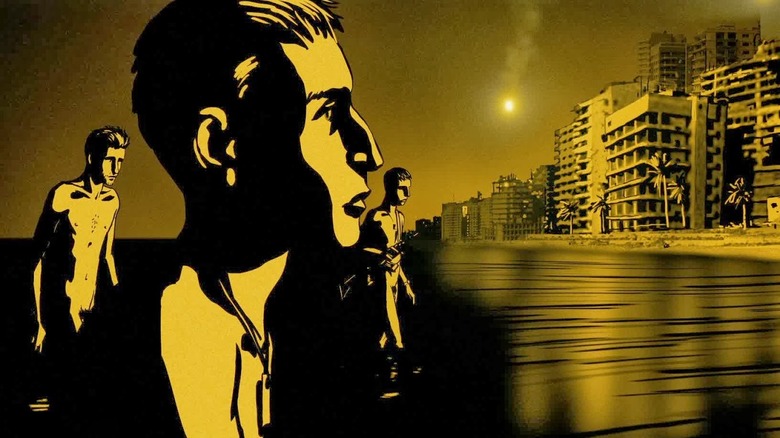
Jonas Poher Rasmussen's festival-darling documentary "Flee" is gearing up for a busy awards season, but it might come as a surprise to some that it's not the first animated autobiographical documentary about war and refugees. In 2007 and 2008, two radical animated films were released -- Marjane Satrapi's "Persepolis" and Ari Folman's "Waltz with Bashir."
The latter is set in Beirut in the early '80s and is a journey into memory for the filmmaker, who is trying to piece together events that he has blocked from his mind. By interviewing his friends from the time, he discerns his role in the Sabra and Shatila massacre.
The animation itself is stunning, with black lines filled by sepia for the flashbacks and more color used in the present-day sections, as well as dream sequences that add to the woozy haze of Folman's memories. The score by Max Richter also contributes to the surreal quality of the memories being rediscovered.
Folman knows that he is on an inevitable path to discovering uncomfortable truths about himself, but once he's started, he cannot stop. An extraordinary film that I hope more people discover with the release of "Flee."
Master And Commander: The Far Side Of The World
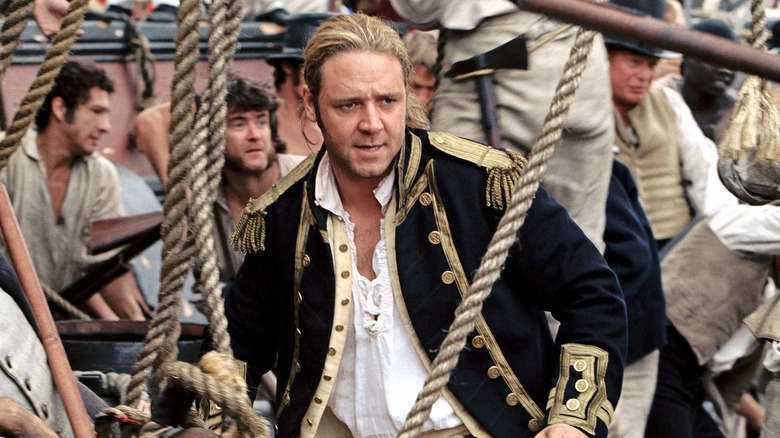
What should have been the first movie of a potential franchise, Peter Weir's adaptation of the first in Patrick O'Brian's Aubrey-Maturin book series is a wonderful sea-based epic set during the Napoleonic Wars, but unfortunately did not do well enough at the box office to justify sequels.
Russell Crowe stars as Captain Jack Aubrey, and the film centers around his close friendship with the ship's surgeon, Doctor Stephen Maturin (Paul Bettany). Captain Jack becomes obsessed with pursuing a French vessel around South America, even though it is much faster and has more fire-power than his ship, the HMS Surprise. Meanwhile, Maturin's obsession is with conducting research on the Galapagos Islands because of its unique flora and fauna.
One of the best (and most realistic) details in "Master and Commander" is that the Surprise has a large number of children onboard, some fairly high up in the ranks. Some of the highlights include the aforementioned Galapagos scenes (shot in the real location), a sequence in which the ship is becalmed and the sailors become superstitious about a "Jonah" onboard, and the trickery involved in both the French and British trying to outsmart one another. The detail of the ship and seeing what life was like onboard is incredible, and you get a real sense of a tight-knit community, cut off from the rest of the world. A fantastic historical blockbuster.
Beasts Of No Nation
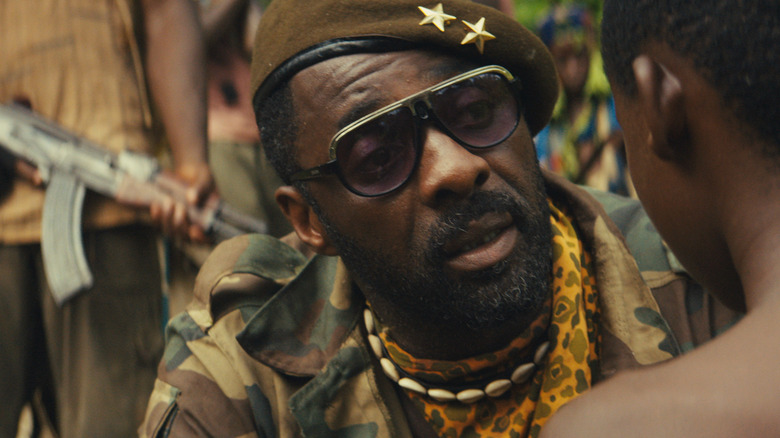
Back in 2015, "No Time to Die" director Cary Joji Fukunaga finally brought his long-planned film about child soldiers in Africa to fruition. "Beasts of No Nation" opens with Agu (Abraham Attah) and his friends playing soccer, which we see viewed through the empty frame of a television. While war rages around them, they are in a "buffer zone," so they're relatively safe for now. We also see Agu's home life -- he complains about his older brother, who is a teenager into music and girls, and the family has belching contests around the dinner table.
It isn't long before war arrives in Agu's world. He's separated from his mother and younger sister, and watches his father and older brother be killed. Agu is picked up by the Commandant (Idris Elba), who runs a band of rebel child soldiers. He becomes completely desensitized to violence and, after the war is over, must learn how to be a child again. A heart-breaking examination of the effects of war, which go far beyond death and destruction.
Downfall
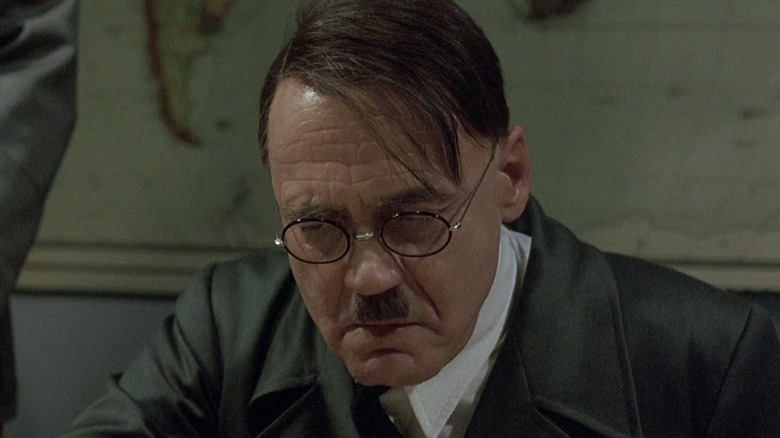
Adolf Hitler is usually a shadowy figure in the background of most WWII films, with the man himself rarely appearing (unless it's a comedy, of course). Therefore, Oliver Hirschbiegel's "Downfall" really stands out as a highly unusual dramatic film that has Hitler (played by Bruno Ganz) as the central character -- and yet it's still been memefied.
The film is based on a book by Hitler's secretary, Traudl Junge (Alexandra Maria Lara), so it is through her eyes that we see the events. "Downfall" is set mostly in the "Fuhrerbunker" during Hitler's last days, when the Russians are closing in on Berlin and Hitler's generals, including Himmler and Goring, try to persuade Hitler to hand over power. However, Hitler believes in the scorched earth policy, and is quite willing to self-destruct Berlin before he will surrender or admit defeat. We see various sweating and shifty-eyed generals come and go, obviously terrified of delivering bad news to Hitler, with him exploding in rage as his ever more unhinged orders go ignored.
"Downfall" offers insight into the last days of a dictator, and shows us just how many people were required to enact his monstrous policies, only for him to call them cowards and traitors at the end anyway. The acting and direction are phenomenal; it's a great German WWII film.
Atonement
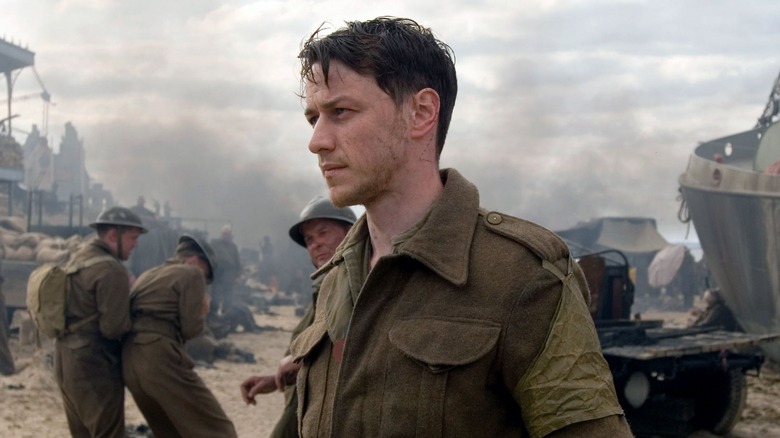
War time is one of the best settings for a love story because the high drama, emotion, and tragedy is built right in. That is very much the case with Joe Wright's adaptation of Ian McEwan's novel "Atonement," in which a misunderstanding leads to a lie told by Briony (Saoirse Ronan), which has a knock-on effect on the fates of her entire household. The lovers in question are Cecelia (Keira Knightley) and Robbie (James McAvoy), who share one of the most famous sex scenes of all time, one involving an iconic green dress and a library.
After the first half of the film, which is set in a stately English home, the action moves to WWII and centers around a stunning five-minute continuous shot on Dunkirk beach, sumptuously scored by Dario Marianelli. "Atonement" really hammers home what a waste of young life happens during wartime. Death is so random, cutting lives short indiscriminately. Each person on the long lists of the dead had a life, a history, a home, and a family, and they also had desires, dreams, and hopes. This stunning film is heart-crushingly sad.
Quo Vadis, Aida?
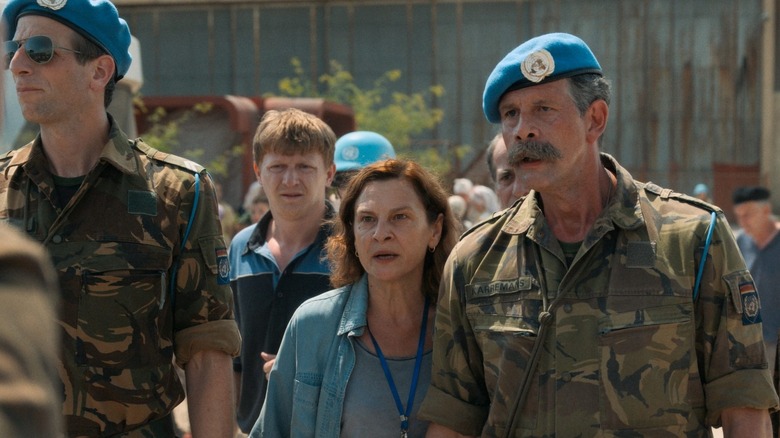
It's surprising that the Bosnian War of the early '90s has not had much presence in film or TV, considering it was the deadliest European war since WWII. Jasmila Žbanić writes and directs "Quo Vadis, Aida?," a film about a UN translator who desperately tries to use her position to prevent her husband and two sons from being taken away and executed during the Srebrenica massacre. She is met with unbearably frustrating bureaucracy and members of the UN who very much have a "our hands are tied" response.
Jasna Đuričić gives a phenomenal performance as Aida, a woman determined to protect her family by any means necessary. She is torn between friends and neighbors who trust her but are in terrible danger, and being in a relatively privileged position, having the blue lanyard of protection around her neck. She tries to aid negotiations that could save thousands, while being terrified for the three people closest to her. The colonel and major from the UN hide behind the chain of command, remaining at a distance from the people they eventually condemn to death.
While the genocide obviously forms a heartbreaking climax to the film, Žbanić does provide an epilogue that takes place years later and sees Aida searching for photographs of her family. It is through witnessing the small actions of individuals that we can start to comprehend the wider tragedy.
Inglourious Basterds
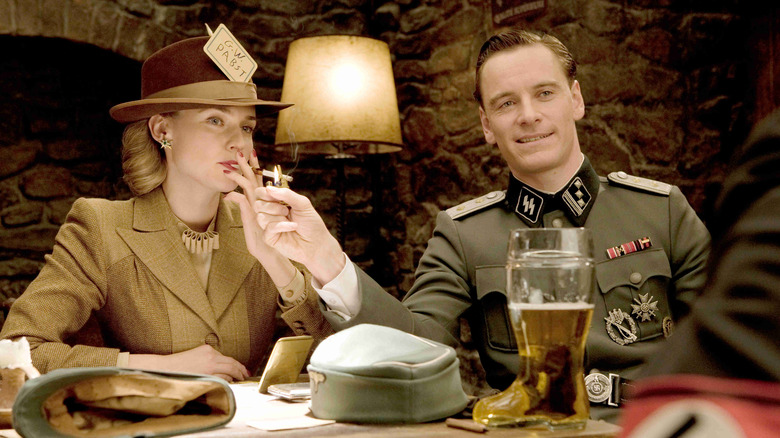
I will admit that when I first saw the trailer for Quentin Tarantino's WWII movie, I thought this tale of a band of Nazi-scalping Jews looked farcically bad. While Brad Pitt, Eli Roth, and BJ Novak are still not my favorite aspect of "Inglourious Basterds," the film has so much more to offer than that. The story revolves around one of the best protagonists and performances of any Tarantino film -- Melanie Laurent (who is also a director) as Shosanna.
The film opens with an unbearably tense two-hander between SS Officer Hans Landa (Christoph Waltz) and LaPadite (Denis Menochet), who is hiding a Jewish family under his floor. Later, there is another tension-filled scene involving Landa, Shosanna, and an apple strudel. While they only have small parts, Diane Kruger and Michael Fassbender are another highlight. And, in case you've forgotten, Mike Myers is in this movie.
The whole thing builds to a thrilling climax in a burning movie theater, and while "Basterds" has a huge cast, many plot threads, and a juggling of tones, it works because the emotional core remains with Shosanna throughout. One of Tarantino's best.
In Darkness
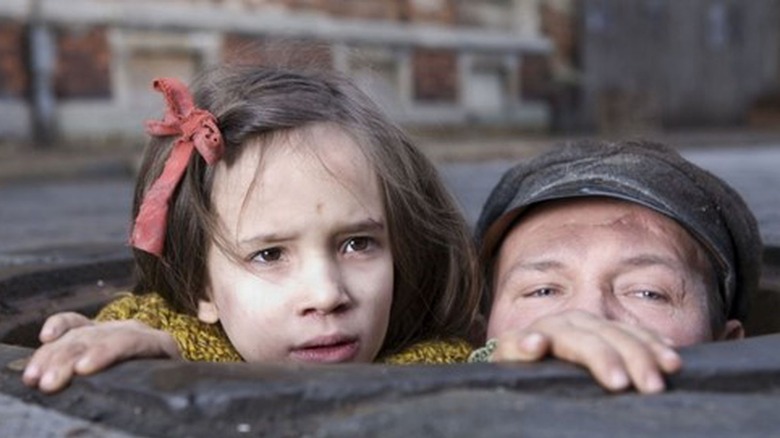
Polish director Agnieszka Holland visited WWII in her Oscar-nominated film "Europa Europa" about a Jewish teenager who joins the Hitler Youth. She returned to the subject matter with the also Oscar-nominated "In Darkness," which is about Socha (Robert Wieckiewicz), a Polish sewer-worker who hides a group of Jews in the tunnels. He clashes with the leader of the group, Mundek (Benno Furmann).
Socha is a complicated character -- he is an anti-Semite and initially is only interested in making money from them, while also being under pressure from the Nazis to turn in any Jews he finds for a fee. However, Socha grows to care for the group (even after they run out of money), which includes children and a pregnant woman. Maria Schrader, the director of "I'm Your Man," plays one of the mothers.
Holland shows the group living in close proximity for months on end and how it inevitably leads to petty squabbles, as well as certain people trying to find ways of having sex with one another, even within these extreme circumstances. Every time they see a flashlight or hear footsteps, they don't know if they have been discovered. An unbearably tense, but very human, story of survival.
Da 5 Bloods
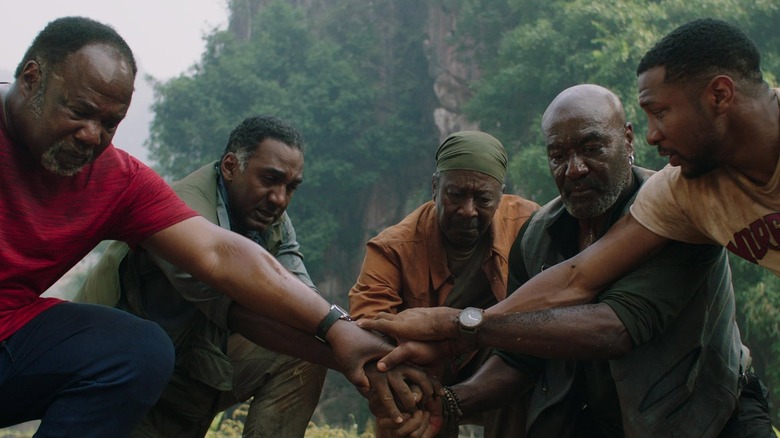
Films that wrestle with the aftermath of wars and take place years later can be even more fascinating than ones that take place during active conflicts. There was a time when Hollywood churned out many Vietnam war movies, including classics like "Apocalypse Now" and "Platoon," but they have dwindled as more years have passed.
With "Da 5 Bloods," Spike Lee tackles the Vietnam movie as only he can. In the film, four veterans return to Vietnam, hoping to find the resting place of their fallen comrade, Norman (Chadwick Boseman). If they also happen to find the gold that they stashed in the same location, then that's just a bonus. Delroy Lindo gives an extraordinary performance as Paul, who has PTSD, and Jonathan Majors plays his son, David, who has a fractious relationship with him. There is an unforgettable monologue that Lindo delivers that should have secured his Oscar.
Lee's signature touches -- inter-cutting the footage with newsreels, double dolly shots, different aspect ratios, Marvin Gaye songs, and a beautiful Terence Blanchard score -- are all present here, combining to make a stunning meditation on war and its after-effects.
Lore
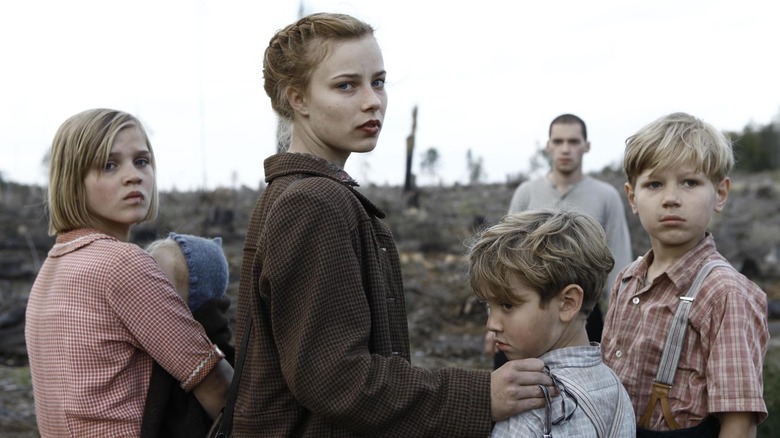
Before taking on the "Black Widow" solo film, Australian director Cate Shortland directed this unusual war story. Set in the direct aftermath of Hitler's suicide, a Nazi officer and his wife realize that the walls are closing in and flee. They leave their five children to fend for themselves, telling eldest daughter Lore (Saskia Rosendahl) that she should try to make it to their grandmother's house in Hamburg. This was perhaps considered a better fate than Mrs. Goebbels poisoning her six children, as seen in "Downfall."
The children's path collides with that of a Jewish man, Thomas (Kai-Peter Malina), who ends up helping the family on their journey. Obviously, the relationship between Lore and Thomas is a complicated one -- there is both attraction and revulsion. Rosendahl gives an extraordinary performance as a teenager who is dealing with normal things like hormones on top of the fraught situation she is in.
The biggest strength of "Lore" is the cinematography by Adam Arkapaw ("True Detective") -- there is a surreal beauty in the obstacles that the family must overcome, which includes fields of mud and abandoned buildings. The writing does well to not manipulate the audience or tell us what to feel, whether it's sympathy or judgement for the characters. An almost unbelievable moment comes when (former) Nazis see photographs from the camps and refuse to believe they're real -- the phrase "paid actors" is bone-chilling. A complex film about the consequences of war.
Their Finest
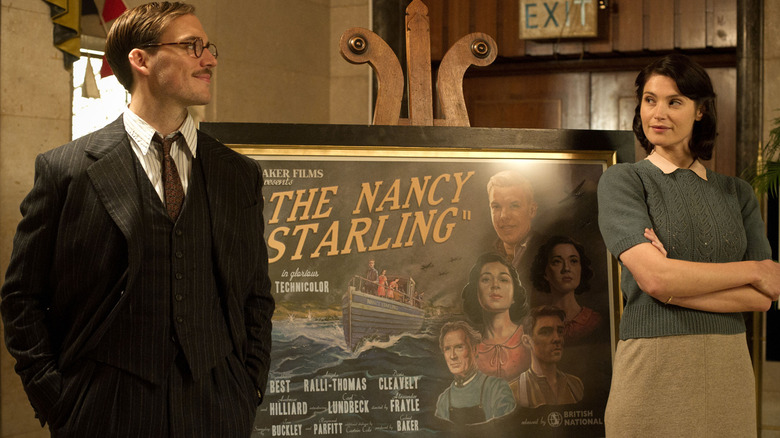
Not just a great WWII film, but one of the best recent films about filmmaking, Lone Scherfig's "Their Finest" is a romantic, wonderfully humorous, and tragically underseen gem. Gemma Arterton stars as Catrin Cole, who is recruited by the Ministry of Information to provide a "female angle" on the propaganda films they are producing. "Their Finest" gives great insight into WWII propaganda movies, which of course produced one of the best films of all time: Powell and Pressburger's "A Matter of Life and Death."
Catrin hears that a pair of young women twins were part of the flotilla of civilian boats that helped with the evacuation from Dunkirk and thinks this would make a good film. Bill Nighy stars as Hilliard, an old theater actor who is down on his luck and recruited to play the "funny drunk uncle" in the movie. Jake Lacy plays Carl Lundbeck, a real-life Norwegian-American war hero who is brought in to play a dashing boyfriend character who saves the day. Sam Claflin plays Tom Buckley, the co-writer of the film, who Catrin butts heads with but then grows close to.
The scenes of the crew filming "The Nancy Starling," as it's called, are massively entertaining, from the trickery involved to make it seem like a beach is packed with soldiers to the misery of having to film in a giant water tank. This film is delightful but surprisingly heartbreaking too.
Journey's End
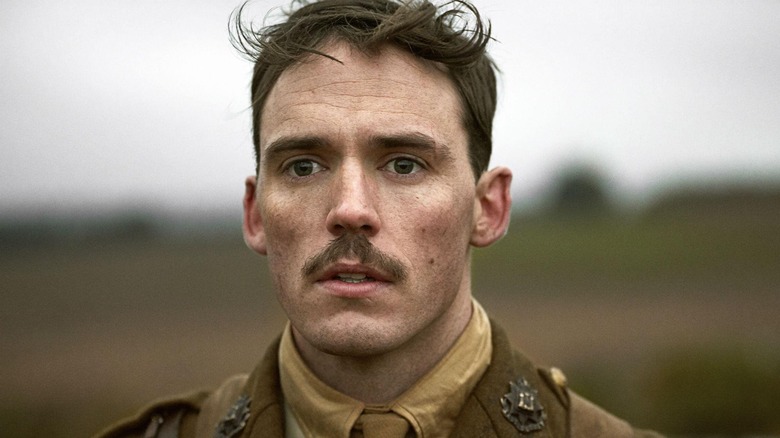
Sam Claflin kept his WWII mustache from "Their Finest" and seamlessly transitioned into WWI with this adaptation of the play by RC Sherriff. "Journey's End" stars Paul Bettany, Tom Sturridge, Stephen Graham, and Asa Butterfield ("Sex Education") as a group of officers in a dugout. The relationship between Captain Stanhope (Claflin) and Osborne (Bettany) is not entirely unlike the one Aubrey and Maturin share in "Master and Commander."
Stanhope has become an alcoholic to cope with the horrible conditions in the trenches, coupled with the constant tension of not knowing when the next order will lead to certain death. Fresh recruit Raleigh (Butterfield) arrives, having specifically requested to be placed under Stanhope because they knew each other at school and Stanhope was close with Raleigh's sister. Stanhope cannot bear the shame of Raleigh seeing what he has become. Claflin delivers by far the best performance of his career in this microcosm of the wider war.
While movies about WWII are dime-and-dozen (as can be seen from how many are on this list), films about WWI are rarer. If you studied WWI poetry in school, you will know how wretched the soldiers felt about the futility of this absurd war that led to massive loss of life for very little gain. There is plenty of amazing WWI literature out there, and we need more movies to reflect this.
1917
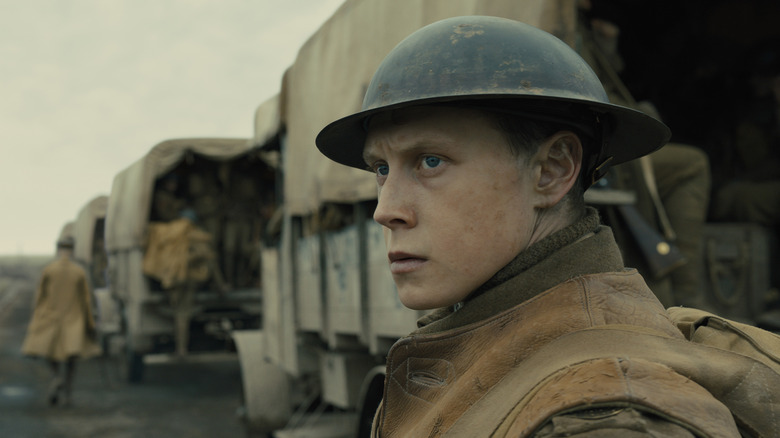
While Christopher Nolan's "Dunkirk" was an amazing and intense cinematic experience (especially on IMAX), Sam Mendes' similarly bombastic war blockbuster "1917" just edges it out (for me). "Journey's End" works so well because it uses a small number of characters in one dugout to represent WWI as a whole. "1917" takes a similar approach, focusing on two characters, Schofield (George MacKay) and Blake (Dean-Charles Chapman), as they embark on a specific mission.
We then see this play out in real time, with Mendes (and cinematographer Roger Deakins) using a "one-shot" effect to keep the action continuous. While some call this a gimmick, it absolutely works to immerse us in the relentless nightmare that Schofield, in particular, has to face. Deakins' camerawork, in particular in the Ecoust section, is phenomenal, with the use of light and shadow creating a hellscape.
Thomas Newman's score is another ingredient that elevates "1917." The final aspect that makes it so good is MacKay's performance, which was unfortunately overlooked by the Oscars. Mendes' experience of directing theatre productions is very obvious here, particularly in how he blocks in the actors in the early scenes set in the trenches. We see the drudgery and boredom before two random men are plucked for a high-stakes mission — this unpredictability was a large part of the war's psychological torture. "1917" is an incredible achievement, and an unforgettable war film.
Read this next: The Best Movies Of 2021 So Far
The post The 14 Greatest War Movies of the 21st Century appeared first on /Film.
from /Film https://ift.tt/3G3w0g1
No comments: